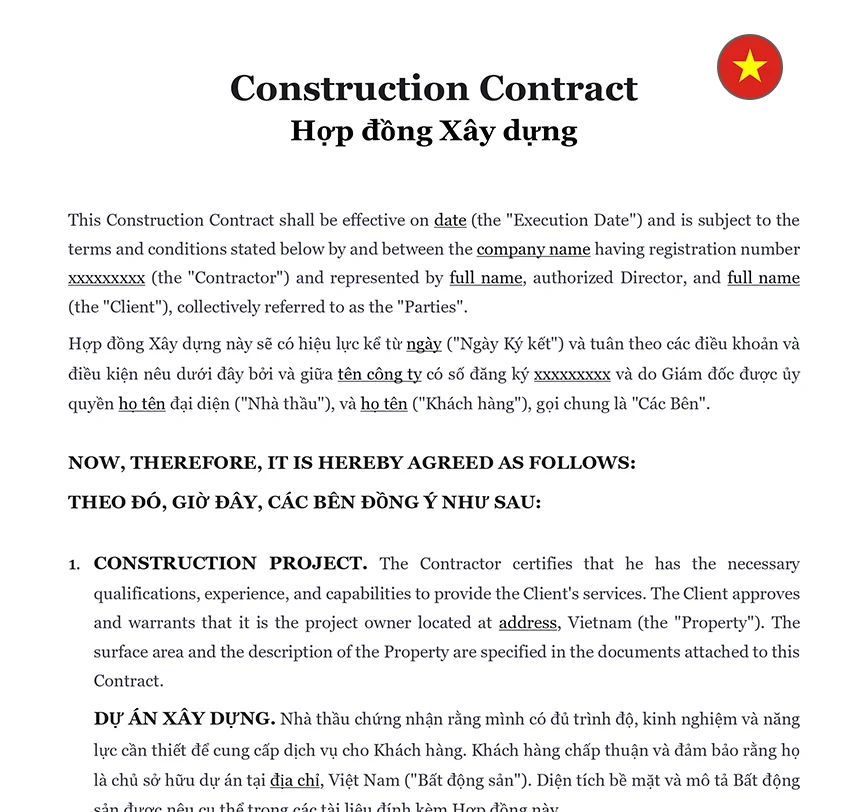Ready to use legal template
Drafted by experienced lawyers
Vietnamese-English translation
Ready to use legal template
Drafted by lawyers
Vietnamese-English translation
Home › Buy a property › Construction contract
Learn more about Construction Contract in Vietnam
A Construction Contract is a legally binding agreement between a property owner and a contractor that outlines the scope of work, responsibilities, timelines, materials, and payment terms for a construction project. Its purpose is to ensure that all parties involved clearly understand their obligations and rights, reducing the risk of disputes or delays. In Vietnam, construction contracts are essential for both private and commercial projects, and they must comply with local laws, including the Law on Construction and related regulations. A well-drafted contract helps protect your interests, guarantees project transparency, and provides a solid legal framework in case of disagreement. Download our Construction Contract template available in an easy to edit Word format and drafted by expert in English and Vietnamese.
Table of contents
-
What is a Construction Contract?
-
What is included in a Construction Contract?
-
Why is a Construction Contract important in Vietnam?
-
What should I look out for before signing a Construction Contract?
-
Can a Construction Contract be changed once it's signed?
-
What should I do if there are changes to my construction plans?
-
Are there any fees involved in getting a Construction Contract in Vietnam?
-
Can I use a Construction Contract for renovations or just new construction?
-
What should I do if there is a dispute over a Construction Contract?
-
Can I cancel a Construction Contract in Vietnam?
What is a Construction Contract?
A Construction Contract is a pivotal document that formalizes the agreement between a property owner and a contractor for a construction project. This comprehensive agreement covers various aspects of the project, ensuring that all parties understand their roles, responsibilities, and rights throughout the construction process.
This contract includes crucial details such as the scope of work, project timelines, payment terms, insurance requirements, warranties, and dispute resolution mechanisms. By clearly outlining these details, a Construction Contract helps to minimize misunderstandings, disputes, and potential delays.
A well-drafted Construction Contract provides legal protection for both parties. It ensures that the project is completed according to the agreed-upon terms and specifications, and it serves as a reference point in case of disagreements or disputes. It is a vital tool that helps to ensure the smooth and successful completion of construction projects while protecting the interests of all parties involved.
🔗 If your project requires the hiring of an architect, you can also download our Architect Contract or Interior Design Contract depending on your needs.
What is included in a Construction Contract?
A Construction Contract typically includes several key components to ensure clarity and legal compliance. Here are the main elements commonly found in such contracts:
1. Parties Involved
Identification of the contracting parties, including the property owner (client) and the contractor(s) responsible for the construction work.
2. Scope of Work
A detailed description of the work to be performed, including specifications, plans, and any relevant drawings or documents that define the project requirements.
3. Project Timeline
Clear timelines and milestones for the project, including start and completion dates, as well as any interim deadlines for specific project phases.
4. Payment Terms
A breakdown of the total project cost, including the payment schedule (e.g., lump sum, progress payments), payment methods, and any penalties or incentives related to payment timing.
5. Change Orders
Procedures for handling changes to the original scope of work, including how changes will be documented, approved, and accounted for in terms of cost and schedule adjustments.
6. Warranties and Guarantees
Any warranties or guarantees provided by the contractor regarding the quality of workmanship, materials, or specific components of the project.
7. Insurance and Indemnification
Requirements for insurance coverage, such as liability insurance and workers’ compensation, as well as provisions for indemnifying the parties against claims or losses.
8. Permits and Approvals
Responsibilities for obtaining necessary permits, approvals, and inspections required for the construction project.
9. Dispute Resolution
Procedures for resolving disputes that may arise during the course of the project, including mediation, arbitration, or litigation processes.
10. Termination Clause
Conditions under which either party may terminate the contract, as well as the process for terminating the agreement and any associated consequences.
Why is a Construction Contract important in Vietnam?
A Construction Contract in Vietnam is essential for ensuring that construction projects are completed smoothly, efficiently, and in compliance with legal requirements, benefiting all parties involved. It is crucial in Vietnam for several reasons:
| ➤ Legal Compliance: It ensures that the construction project complies with Vietnamese laws, regulations, and building codes, reducing the risk of legal issues or penalties. |
| ➤ Clarity and Understanding: By clearly defining the scope of work, timelines, payment terms, and other project details, a Construction Contract helps to prevent misunderstandings between the parties involved. |
| ➤ Risk Management: The contract can allocate risks between the parties, such as the risk of delays, defects, or changes in material costs, helping to manage these risks effectively. |
| ➤ Dispute Resolution: A well-drafted Construction Contract provides mechanisms for resolving disputes that may arise during the project, such as through mediation, arbitration, or litigation, which can help to avoid costly legal battles. |
| ➤ Quality Assurance: The contract can specify quality standards and requirements for materials and workmanship, ensuring that the construction meets the expected quality standards. |
| ➤ Financial Protection: The contract outlines payment terms, including the schedule and amount of payments, providing financial protection for both parties and ensuring that payments are made on time. |
| ➤ Project Management: It serves as a roadmap for the construction project, helping to keep the project on track and ensuring that both parties are aware of their responsibilities. |




